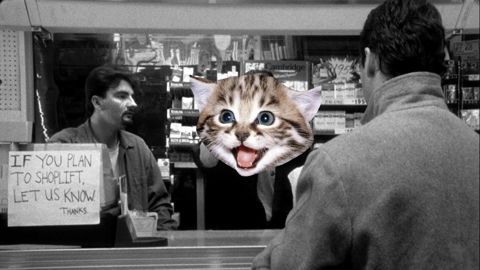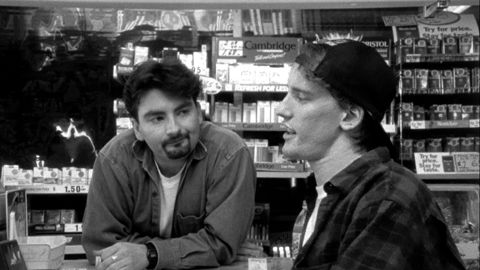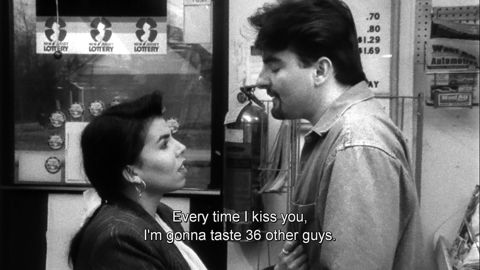Clerks. (1994)
I Assure You, It’s Fine!
I was twelve years old when my friends discovered a filthy video tape. No, not Seymour Butts. That wasn’t me who found it in the woods, and that was later. I’m talking about Clerks, a movie famous among us then-children for its choice in raunchy dialogue. Out of all of them, Clerks dared to “go there.” Adam Sandler fought Bob Barker in Happy Gilmore. Dumb & Dumber had that attempted gay rape, and other shit we thought was hilarious. But Clerks talked about rows of blowjobs and jizz on peep show windows and dead men’s boners and several other topics I’d never heard of. Clerks was so frank with its dialogue, in fact, the MPAA originally rated it NC-17 based on language. Fuck! I mean, cock and tits!
Clerks wasn’t just legendary for being potty-mouthed. It was also a major success story. Kevin Smith, then a young cashier from a working class background, took inspiration from Richard Linklater’s filmography. He typed out a screenplay, and then he pulled together $27,000 to produce Clerks through sheer will, good friends, and a head full of dreams. The ripple effect was such that he now has more money than most of us will ever see.
But while us Millennial upstarts couldn’t help but picture what Randal’s hypothetical nudie booth looked like, streaks and all, it should’ve been a wakeup call. If a man can craft something like this out of so little, why can’t you? Stop playing Zelda and make your name known.
But here is where I run into a wall, folks. I still like this movie a lot, but damned if I’m not conflicted about Kevin Smith’s latter day work. These days, his output feels so lifeless and cheap. He obsesses over his own nostalgia and wallows in tired catchphrases. As of this writing, I’m still reeling from whatever he was trying to do with Jay and Silent Bob Reboot. I’m divided about Clerks III after viewing it twice.
Clerks is a slice-of-life story where the title describes its subject matter. Clerks is concerned with clerks, and their lives behind the store counter when we can’t hear them. In real life, store clerks are people we exchange pleasantries with, or are rude toward, long enough to pay and go home. We never think about who rang up our total at Dollar General, where they go after work, or what they did before arriving that morning.
Dante Hicks (Brian O'Halloran) is such a clerk. A phone call in the early morning forces him out of his bedroom closet. He was supposed to have this day off, as he reminds us numerous times. But now he has been summoned to fill in at the local Quick Stop convenience store downtown, ruining his plans for the day.
The morning begins badly. The rest isn’t much better. Dante is exhausted. He is exhausted because he was on the phone all night with his ex-girlfriend, Caitlin (Lisa Spoonauer). He’s still hung up on her, even though their relationship ended in high school after she cheated on him an astronomical number of times. Under normal circumstances, this wouldn’t be too awful of a predicament.
Except Dante has a current girlfriend, Veronica (Marilyn Ghigliotti). This isn’t one of those comedies where the partner is some kind of monster, and the ex is the better choice. Veronica is devoted to Dante, and insistent because she wants better for him. Dante, nevertheless, finds Veronica irritating. Her pressure on him to finish college is headache-inducing enough. But when she confesses her kill count for past liaisons—orally speaking—it sends him into hysterics.
Randal Graves (Jeff Anderson) works next door at RST Video, one of those mom-and-pop walk-in closets you used to see on every street corner. We romanticize them because they no longer exist, but back then they weren’t reputable for their wide selections. If you visited RST Video in 1993-94, you might’ve been lucky enough to find a copy of Mom and Dad Save the World.
For Randal, a typical day on the job is sitting comatose while watching movies on the store’s television. That is, when he isn’t locking the door to hang out with Dante. He also possesses a viper’s customer service skills. To Randal, customers are parasites. His treatment of them runs the gauntlet from spitting on them to showing a gynecological close-up from a porn magazine.
When Randal’s presence isn’t causing Dante more problems, his personal life continues sliding downhill. He’s confident he’ll win Caitlin back, while not seeming to care much about screwing over Veronica. Then he sees an announcement in the paper that Caitlin is engaged to an ‘Asian Design Major.’ Caitlin shows up in person later, to complicate the situation and transform a hypothetical love triangle into a real one.
Of course, I couldn’t talk about Clerks, or any Kevin Smith movie for that matter, without mentioning Jay (Jason Mewes) and Silent Bob (Smith himself). Clad in then-grunge era clothing, Jay and Bob are two drug dealers permanently planted outside the stores. Here, they aren’t main characters, superheroes, or divine prophets. Their role is to be a constant pain in the ass for Dante and Randal.
The day goes on. While Dante implodes under his own pressure, the movie captures his conversations with Randal. They talk about who hooked up with who after high school, or which Star Wars sequel had the better ending. They point out customers’ weird behavior, like a man who can’t find the perfect carton of eggs, or a woman searching through the milk for an infinite expiration date. The two employees also have graphic discussions of sexual acts and functions, regardless of who is listening.
There’s a dynamic here, and it raises interesting points. Randal, born with no filter, is rude and uncouth. But the ultimate question becomes, who is the bigger asshole, Dante or Randal?
The truth is they’re both assholes. Dante is the kind of dick who lacks the self-awareness to realize he is a dick. Randal revels in dickishness and doesn’t care. He can be as much of a dick to customers as he wants to, because unlike Dante, he recognizes there is something beyond this. Even if his behavior gets him fired, he’s only 22, and he can drift over to another minimum wage gig. In other words, Randal possesses odd wisdom beyond his age. He has the clairvoyance to see what’s ahead of him, something many of us didn’t develop until it was too late.
Dante is doing the same shit I did at 22, treating the smallest setbacks like the universe is collapsing on itself. Barely into young adulthood, he acts like he’s 45 and his best years are behind him. Every personal life decision of his is an attempt to recapture his youth, to return to high school where he peaked. Randal, meanwhile, acts as the wise devil on Dante’s shoulder, trying to guide his friend toward blatant truths.
Clerks was shot on location at the store where Smith worked, only at night when he had permission to bring in his crew and equipment. These aren’t assembled-together sets we see during the movie; the camera captures the interiors from life. In the video store, copies of Boomerang sit on the New Release shelf in the background. Clerks is a time capsule of a bygone era, frozen in place. It allows us to dwell in spaces we can only remember thirty years later.
The whole movie was shot in black-and-white, too—off-putting for some, charming for others. In the early 1990s, $27,000 only paid for a black-and-white camera. But this helps the film rather than detract from it. Since the majority of Clerks is set between two independent retail locations, the cheap grayscale makes the final result look like old surveillance camera footage. It’s like a documentary assembled from security tapes.
Now, this review was a long time coming. I’ve reviewed Clerks at least twice before this. But those previous versions have grown undated and unpresentable as I’ve aged more, so I’m always starting over from scratch. This is the last time. This Clerks review is the official Special Edition release, the one I wanted out there.
But sitting down to write this was difficult for me; it brings on a heavy sense of contradiction/hypocrisy. The same stuff I can call positive could also be considered a negative. Part of this has to do with my Reboot review, but there are also my issues with Kevin Smith.
One of my favorite critics and influences, The Filthy Critic, said of Dogma in 1999, “It’s a tedious exercise in mental masturbation by a guy who loves hearing himself talk.” And tha’s the best summation I’ve found of Kevin Smith in so few words: he loves hearing himself talk. He talks, and he wants you to hear how he views the world. All of Kevin Smith’s dialogue is Kevin Smith talking, and it didn’t start with Dogma. In Clerks, he talks through his characters the same way Matt Stone and Trey Parker talk through their South Park kids. He is the living personification of “write what you know,” turned to eleven.Clerks, and every other Kevin Smith movie, is so autobiographical one can’t argue, “this is fiction,” or “these are fictional characters.” The self-indulgence is as prevalent as Jay and Silent Bob Reboot was 25 years later. Am I hypocritical for giving Clerks a pass on this, but not that one? I shouldn’t give it a pass. But in this case, the self-indulgence issue is not the fault of Clerks, the first movie. It’s future Smith’s fault for not fixing it later. Are we supposed to go back in time and slap someone in the head for his past output? Clerks was written and directed by a 23-year-old with only 23 years of life experience. He had plenty of time to move on from making every movie about himself or his philosophy, but he didn’t. But shit, I have no problem putting Clerks into the player.
Although, I will say, time-travel slaps aside, the blowjob argument hasn’t aged well. And this isn’t about me getting on a soapbox about slut-shaming, though there’s some of that in there, too. My problem is the blowjob argument is—again—Smith’s own growing pains. In the movie, it’s treated as something Dante is being a dick about. Smith doesn’t treat his female characters like shallow characters, either. Even Caitlin, the legendary high school super-cheater, is reasonable when we finally see her. But knowing what we do now, about Smith’s fights with Joey Lauren Adams and her sexual history during the production of Chasing Amy, this is another autobiographical element. It probably means he had this same argument with another ex-girlfriend and dramatized it in the script. It also means that the author himself didn’t learn from this and kept having hang-ups over the next few years. This is human. But there’s a lot here that’s raw, exposed, sad even.
Clerks originally ended with a robber shooting Dante at closing time. The final cut, of course, does not use this footage, and Dante goes on to live for two Clerks sequels.
I’m glad Smith dropped this. Not only is it a complete tonal shift from 89 minutes of a comedy, it’s incredibly pretentious. The ending would’ve gone down in history as another example of the dark, edgy, envelope-pushing ‘90s. Avant garde. Dogme-something-or-other. But dumb. I mean, you get it, right? Dante wasn’t supposed to be there! He really wasn’t supposed to be there after all, to catch a bullet! But Smith was making Clerks, a movie about stoners, post-high school adolescence, rooftop hockey, hermaphrodite porn, and cat shit. He wasn’t making fucking Kids.
I’m a lot older than when I watched Clerks for the first time. It holds up, though. It’s written well, and Smith’s attention to themes and character conflicts come from someone with enough sense to make it believable. If there’s anything bad to say about Clerks, then the reality is Smith could’ve done a worse job—like, The Room worse. Hanging out at the Quick Stop shows us the world of a 20-something, wise beyond his years, but with a lot of growing up left to do.
Final Grade: *** ½


